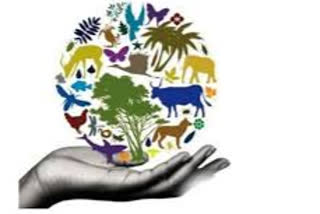Hyderabad:As we celebrate the International Biological Diversity Day, 2020 we need to remember - We are nature, not separate from her. Ancient seers of our land described this relationship as one big universal family- Vasudeva Kutumbakham - that supports and sustains each other; from the slimy earthworm to the mighty elephant. We learnt, sometimes with difficulty (famines, floods, etc), lessons from the planetary consciousness, and exulted the inter-dependence of all life.
All our ancestors have toiled for centuries, so we could be the beneficiaries of diverse, climate-resilient and nutritious seeds. As a result today Indians have the largest diversity of plants and foods. India alone accounted for over 200,000 varieties of rice.
We honoured the seeds- from Barley to Ragi, with sacred rituals for bestowing upon us health. We pray to nine goddesses during Navratri and offer them each a sacred seed. From birth to death, our biodiversity is conserved in our rituals. In many communities still in India, brides carry to her in-law’s, the gifts of native seeds and of course, sacred spices like turmeric, etc. In fact, sugar cane in Sanskrit is ‘Ikshu’ and the dynasty of the mythological King Ram was Ikshvaku. Uncanny coincidence?
The animal family was not left out either, we sanctified them as companions or steeds of Gods and goddesses. Even the most hated pestilence to the West, the rat, is associated with holiest Ganesh. The subcontinent civilisation saw beyond anthropocentric myopia and valued each being as sacred, for each one of them contributed to the larger wheel of life. But sadly, these were just “pagan rituals or superstitions" for the officers of the East India Company. Baffled with enigma they were quick to blasphemously rechristen our sacred seeds - Pigeon Pea, Cowpea, Horse gram, etc. With the mighty gunboat and lust for gold, the colonist birthed a class of compradors, who focused on the reversal of our ancient ways of life. They infected us with a virus - the conquest of Nature. And with the age of imperialism, began the great fall from Eden into the desperate hell of pillaging of the Earth and all her living beings for the great pirate overlords.
But is the conquest of Nature over? No, the conquest has evolved. Instead of the East India Company, we have larger behemoth Agri-Giants that survive on the plunder of and bio-piracy. India the land of abundance and diversity, is losing her true wealth - our connection with our biodiversity, our seeds, our medicinal plants, and our genetic diversity of our animals.
But at the national level, there are greater threats, Indian plant genetic resources (PGR), which is one of the highest in the world, is being pirated abroad. Sometimes due to laxity of enforcers and other times illegally. Nevertheless, treaties like ITPGRFA and UPOV are trying to bully India into surrendering all our PGR for corporate exploitation, while receiving minimal remuneration and benefits for the communities that have co-evolved these plants and seeds. There is also an attempt to subvert our Biodiversity Act, and undermine the National Biodiversity Authority, by these treaties.
International seed companies including Chinese ones are controlling 100% subsidiaries in India, accessing strategic PGR and exporting parent lines of our varieties to their nations, meanwhile Indian companies can’t even own companies in China, Thailand, etc forget exporting parent lines of varieties. We need to have a more nationalistic FDI policy especially dealing with our PGR as it is a treasure trove that will prepare us to face challenges such as climate change. Next policy step to conserve diversity, is to have strong protection of farmers’ rights to breed and co-evolve newer varieties. As the theme ‘Our Solutions are in Nature’, suggests we must also harness the wild varieties and land races for meeting newer challenges, but this should be done sustainably, involving local communities and farmers instead of patented technological alternatives, which are expensive and promote profiteering.
MS Swaminathan, father of the Green Revolution, numerous times stressed on how Indian biodiversity has the potential to meet all of our needs, we don't need gene modifications or other interventions like CRISPR, etc. We must look towards Nature and her abundance for solutions.
Each of us has to embrace biodiversity-based products in our lives. Not only will it be an economical option but also the healthier one. Starting from our plate, we all can include one millet meal or local varieties of rice/wheat. This will increase the biodiversity of our gut and improve health. We need to also bring back local native vegetables and prefer seasonal and locally grown over cold storage vegetables. For processed foods, we again must buy as much as we can biodiversity-based products and support native tribes. For our clothes too, we need to need the hegemony of Bt Cotton, it's about time that Indians like other more conscious citizens choose cheaper alternate fabrics and support handloom and sustainable clothing collectives.
The true solution lies in awareness. We need to embrace our vast family - Vasudeva Kutumbhakam -and bring back biodiversity and sacredness into our lives. We need to dispel warmongering against Nature for profits and embrace the abundance she provides. We ought to change our behaviour and our language (which treats Nature as dead and object). We need to remove the ‘It’ to denote Nature, and refer to her, as the goddess, she truly is.
